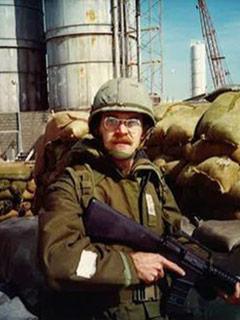
Joined
1976
Postings
- St-Hubert, QC
- Regina, SK
- Moose Jaw, SK
- Ottawa, ON
Deployments
- Gulf war: 1990-91
- Bosnia: 2002-2003
- Afghanistan: 2007-2008
“I’ll be releasing with a hockey sock full of stories” says Warner, looking back on his extensive service. Enlisting in the reserve in 1976, at only 16 years of age, Warner was following in his father’s and two older brothers’ footsteps. All of them served in reserve units around Sherbrooke, Quebec.
Warner remained a Reservist until his graduation from Bishop’s University in 1982. At that point he released to focus on a career in the private sector. Five years later he found himself drawn to the CAF once again and decided to rejoin, but as part of the regular force this time around.

Photo credit: Cpl Paul MacKenzie, CAF
After several months perfecting his French at the Canadian Forces Language School in St-Jean-sur-Richelieu, Quebec, he went to acquire “on the job” experience within his new trade as a clerk in Trenton, Ontario. Warner’s first official posting was in St-Hubert, Quebec.
In the summer of 1990, Canadian Armed Forces members were sent to a Quebec community west of Montréal during the Oka Crisis to help deal with an Indigenous land dispute. Warner was employed as a clerk to handle messages and type orders for senior Commanders. The year before, he had also been involved in a training exercise, in Wainwright, Alberta, where a division-level headquarters had to be set up from scratch. This experience would come in handy shortly after.
The Gulf War erupted when Iraq invaded Kuwait, in August 1990. Canada joined the American-led coalition right away, greatly increasing its presence in December of that year. Warner wanted in on the action. “I was working over the weekend, receiving messages. I saw one coming in that said ‘FMC Headquarters will provide’, and it was a long list of trades, ranks and experience levels, and down at the bottom, they wanted a Corporal Private administration clerk with Brigade or Division-level headquarters experience. I said ‘that’s me!’”
“Being involved in something big is exciting. Getting involved in a war where I was not likely to be involved as a combatant was an adventure into a strange place.”
It all happened quickly. The next working day, Warner volunteered to go. That Saturday, he found himself in Kingston for three-weeks of pre-deployment training. He arrived in the small nation of Bahrain, late in October 1990. It was his first time being outside of North America. “Being involved in something big is exciting. Getting involved in a war where I was not likely to be involved as a combatant was an adventure into a strange place.”

Terry Warner on guard duty at the Bahrain headquarters.
The Joint Command headquarters where Warner worked in Bahrain was the first of its kind for Canada in modern times. Led by a Naval Commander, the headquarters regrouped the Air Force, the Army and the Navy under one roof. His previous experience in this type of work was instrumental in helping set up the headquarters.
As Coalition forces launched attacks to liberate Kuwait, in January 1991, Canadians like Warner were busy relaying important operational information. They also kept an eye on the distant combat from their sandbank bunkers on the wharf in Bahrain. “Missiles had flown, and we had to go into protective cover often during Saddam’s attacks on us, but we had no Canadian casualties. Nobody was close to any of the missile strikes.”
On 28 February 1991, one hundred hours after ground combat operations began, the Coalition had liberated Kuwait and a ceasefire was declared. While many of Warner’s comrades were excited to head home, he felt he could still contribute. He volunteered to stay with a small contingent of under 30 Canadians troops, to participate in “Operation MAGNOLIA.” These soldiers were the only Canadians who served in Kuwait.
“Driving into Kuwait City, and seeing the damage that modern warfare can do to a modern city (…) We’d been paying attention to it from a distance. Helping the Kuwaitis get back their city, it made it all worthwhile.”
This contingent’s task was important: safely remove all the explosive remnants of war. Kuwait City was full of burned out cars, tanks, unexploded artillery and aircraft bombs. “Driving into Kuwait City, and seeing the damage that modern warfare can do to a modern city (…) We’d been paying attention to it from a distance. Helping the Kuwaitis get back their city, it made it all worthwhile.”
While in Kuwait, Warner was promoted to Corporal. In 1999, he changed trades from administration to geomatics (mapmaking) and then climbed up the ranks from Corporal to Warrant Officer in only 9 years. He was deployed overseas twice more during his service, once in Bosnia and once in Afghanistan. Warrant Officer Warner will be releasing from the CAF in March 2021, 45 years after donning his first uniform. “I will very proudly say I’ve worn the Canadian flag on my uniform. I’ve worn the Canadian flag almost all of my adult life, and I’ve felt immense pride in being able to represent Canada.”
With courage, integrity and loyalty, Terry Warner has left his mark. He is one of our Canadian Veterans. Discover more stories.